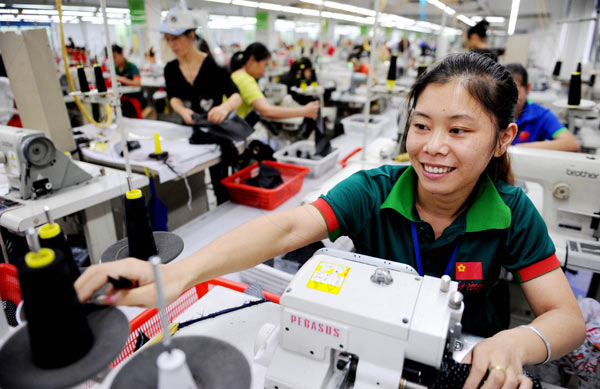

|
 Workers made clothes at a private company in Dexing, Jiangxi province. In 2012, the proportion of private enterprise in China's GDP exceeded 60 percent.[Photo / China Daily]
|
Private ownership is expected to play a bigger role in boosting a domestic economic revival while State-owned enterprises in key industries will become a global presence, experts have predicted.
As China's government accelerates economic reform, a new framework for State and private enterprises has emerged.
"Private capital is currently playing a crucial role in the national economy, especially as GDP has sagged recently," renowned Chinese economist Mao Yushi said.
"Maintaining stable economic growth actually relies on private companies instead of SOEs," Mao added.
In 2012, the proportion of private enterprise in China's GDP exceeded 60 percent. As of September 2012, registered private enterprises totaled more than 10 million in China, up 12.6 percent year-on-year, according to the All-China Federation of Industry and Commerce.
During the recent slowdown, one of the government's most effective ways of boosting the economy has been to facilitate the development of private enterprise.
Speaking to SOE executives and private entrepreneurs at a State Council meeting earlier this year, Chinese Premier Li Keqiang promised to provide privately owned companies with platforms comparable to those of State-run and foreign firms.
Li said China still needs to promote market-oriented reforms. Although there may a few problems at first, the new competitive rules will be effective in the long run, he said.
Protecting privately owned companies is the right move for the government to make, Mao said.
Meeting with experts at Tsinghua University last week, President Xi Jinping said that the government will lay out a general plan of comprehensive reforms at the upcoming Third Plenum of the 18th Chinese Communist Party Congress.
In a report on the Third Plenum, Standard Chartered Bank said a plan targeting economic growth will be released.
"The Chinese government should take more steps to let private capital get involved in infrastructure construction and investment," the British bank said.
"Leading private companies involved in railways, healthcare and other industries will raise fair-market competition and help change the advantageous operational environment of the SOEs," it added.
Easing the entry of private capital into the financial, energy and railway sectors will soon become the new focus of China's economic reforms.
 World's first 1-liter car debuts in Beijing
World's first 1-liter car debuts in Beijing
 Paper-made furniture lights up art show
Paper-made furniture lights up art show
 Robots kick off football match in Hefei
Robots kick off football match in Hefei
 Aerobatic team prepare for Aviation Convention
Aerobatic team prepare for Aviation Convention
 China Suzhou Electronic Manufacturer Exposition kicks off
China Suzhou Electronic Manufacturer Exposition kicks off
 'Squid beauty' and her profitable BBQ store
'Squid beauty' and her profitable BBQ store
 A day in the life of a car model
A day in the life of a car model
 Vintage cars gather in downtown Beijing
Vintage cars gather in downtown Beijing